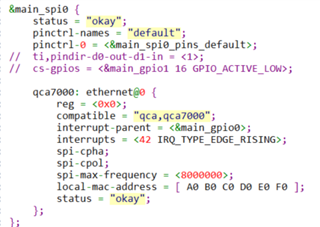Hello,
After modifying the DTS and adding the QCA7000 driver, Linux fails to detect QCA7000 on the SPI bus during boot.
The modified results are as follows:



Output errors:
root@am62xx-evm:~# dmesg | grep spi1
[ 1.526928] qcaspi spi1.0: ver=0.2.7-i, clkspeed=8000000, burst_len=5000, pluggable=0
[ 1.534950] qcaspi spi1.0: Invalid signature (0xFFFF)
[ 1.540113] qcaspi: probe of spi1.0 failed with error -14
The identified problem is that EXP_SPI0_CLK is not generating the expected output during Linux boot.
Is our modification correct, or did we miss anything?
Do you have any suggestions? Looking forward to your reply. Thank you.

